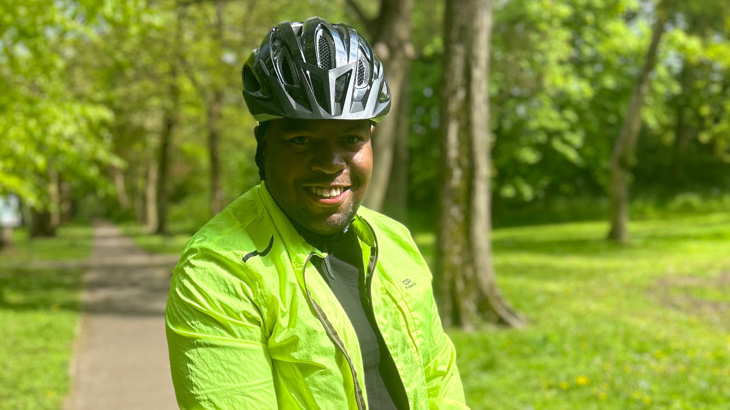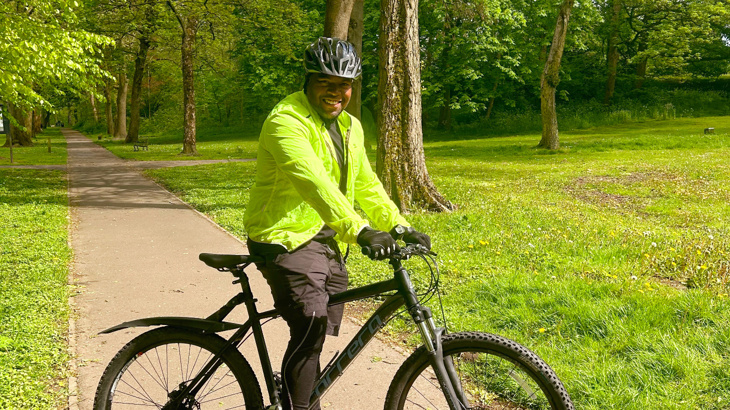In this blog, Nathan from the West Midlands describes the moment he discovered the mental health benefits of cycling and how he later shared the same experience with someone else. He also talks about the reality of health inequalities between communities and the importance of promoting cycling for wellbeing among underrepresented groups.

Nathan describes the moment he discovered the mental health benefits of cycling. Credit: Nathan Dennis
Experiencing the wellbeing benefits of being on a cycle
Amid the third Covid-19 lockdown I was experiencing low moods. I’d had enough of everything.
One day, my friend randomly turned up outside my house in a van with two mountain bikes in the back.
He said: ‘I don’t care how long it takes you, I’m not leaving until you come with me – we're going for a bike ride.
‘Something’s telling me that I need to come and pick you up.’
We went to Cannock Chase Forest, just outside of Birmingham. It was absolutely phenomenal.
We cycled and chatted the whole time.
Feeling the breeze and looking around at the tall trees and the greenery while breathing in the fresh air – it was like therapy.
I felt healed through cycling.
It was kind of crazy to me because as a child I’d cycled for fun, but that was the first time I’d cycled for therapy.
I really experienced and felt the wellbeing benefits from that experience.
Sharing the joy of cycling
I recently returned the favour and passed that same feeling on; I went back to Cannock Chase and took someone along with me who’s going through a tough situation.
We hired e-bikes there, it was really good fun.
The person I went with was blown away by the beauty of our surroundings. He couldn’t believe how close it is to Birmingham.
At the end of the ride, he said: ‘This is amazing, I feel so much better. Thank you.'

I recently returned the favour and passed that same feeling on; I went back to Cannock Chase and took someone along with me who’s going through a tough situation. Credit: Nathan Dennis
Equality is about equal access for all
We need to communicate the benefits of cycling with different communities.
Cycling should be promoted as much as possible as a tool to improve wellbeing.
Not just that, but practising mindfulness when going for walks or cycles to keep you present and in the moment is beneficial too; even something simple like listening out for bird song.
Equality is about equal access for all.
Unfortunately, our society isn’t wired like that.
When you look at health inequalities between different communities in the West Midlands, it’s really shocking. Especially within Black and Asian and ethnic minority communities.
Things like air pollution and not being around green spaces can have a negative impact on people.
Where you live can determine your life expectancy.
When looking at inequalities, it’s true that typically there’s better cycling infrastructure in more affluent areas.
In Birmingham, Sustrans' Walking and Cycling Index (2023) found that 86% of residents agree that more parks or green spaces close to home would help them walk or wheel more.
Cost is a barrier
When I hired a couple of e-bikes for the ride at Cannock Chase I was shocked at how much it cost for the holding deposit to hire one. It was £1,000 per bike.
For a standard bike it was £200.
This kind of cost can be a barrier for a lot of people.
When you’re just thinking about paying your bills and getting through life, to then have to think about the cost of a bike to buy and other equipment you might need – it all adds up.
Addressing the lack of representation in cycling
The lack of representation in the cycling comes back to inequality, economics and access.
For people living in one-bedroom flats, with no storage outside where are they going to store their bikes?
Compare this to people who can afford a car and have a bike rack to be able to go out and access nature spots.
I think it’s inequality playing out and cycling is still very much seen as a white middle-class hobby or sport.
In England’s capital city, research has been carried out on Black men and barriers to cycling. As part of the research, it highlighted that 55.3% of Black Londoners live in flats - compared to 41% of White Londoners and 37.4% of Asian Londoners (2011).
Interviewees highlighted council estates, especially tower blocks as being difficult to access and store bikes.
They also raised the problem of cycle theft and secure cycle parking, including at home.

The lack of representation in the cycling comes back to inequality, economics and access. Credit: Nathan Dennis
Discovering the benefits of active travel
Cycling should be promoted as much as possible as a tool to improve wellbeing.
Hopefully people can continue to discover the benefits of walking and cycling and pass them on like I did.





